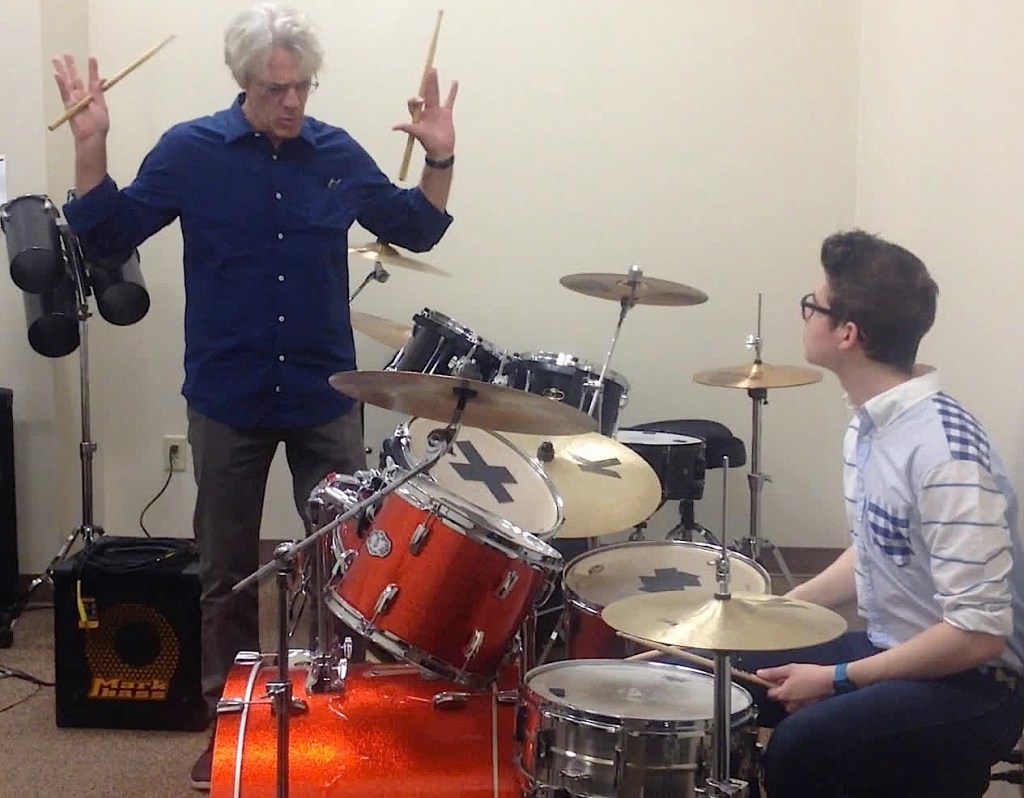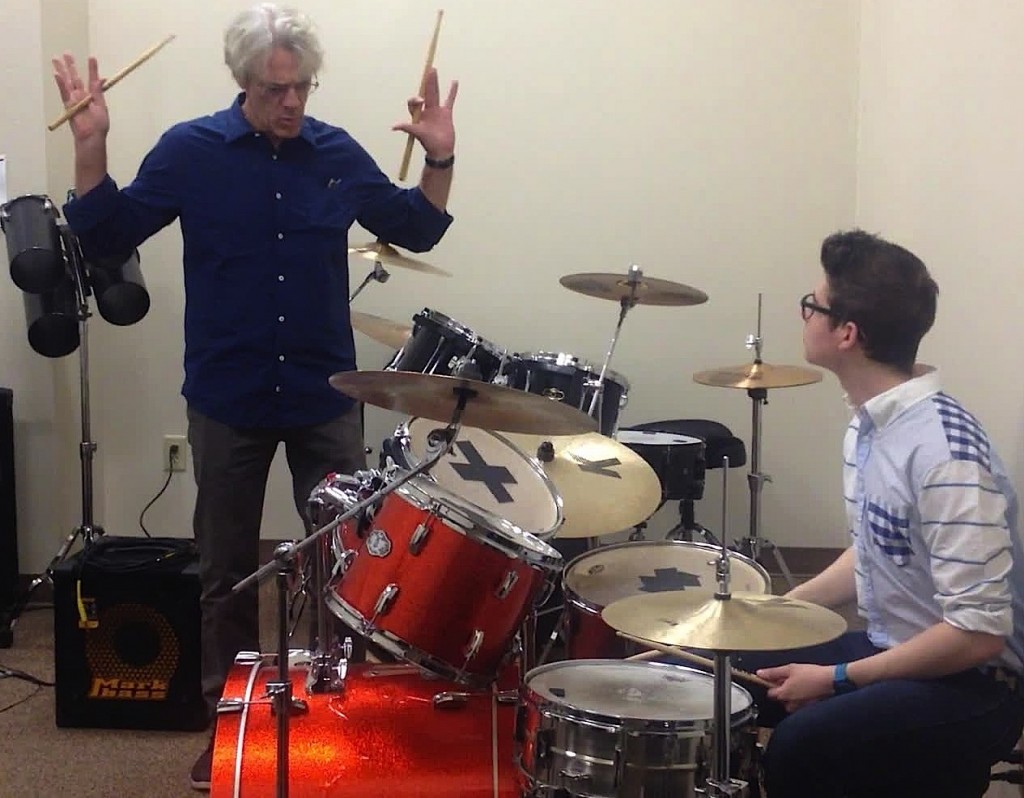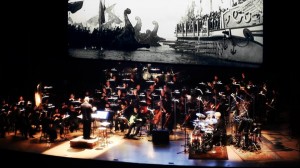Tim Kane The Lesson of a Lifetime: Inside a Live Tutorial with Famed Drummer/Composer Stewart Copeland (VIDEO)

Following a two-hour private drum lesson awarded by composer and multi-instrumentalist Stewart Copeland to one very lucky local high school student, the founder of world famous rock band the Police openly wondered why his celebrity status keeps growing. The sixty-two year old Copeland, whose Facebook fan base tops 76,000, continues to field demand for his critically acclaimed drumming prowess and orchestral composing talents.
Seven years removed from what reportedly was his final world stadium tour with Police band mates Sting and Andy Summers, Copeland says his private life has taken center stage again with his wife, Fiona, and seven children. In his spare time, Copeland continues pursuing his other lifelong passions for composing and filmmaking. Copeland has shifted musical gears after many years spent writing soundtracks for a stress-filled television and movie industry by investing more energy into composing orchestral and opera scores, often linking nostalgic silent and classical films to live performances.

Photo by Tim Kane
World-renowned drummer and composer Stewart Copeland expresses the importance of mastering the paradiddle rudiment to his student Chris Barry at Eagle Hill School in Hardwick last Thursday.
In his most recent stint this past year, Copeland restored MGM’s frozen 1925 archival epic Ben-Hur: A Tale of the Christ made famous by actor Charlton Heston in the 1959 version. Copeland purchased, thawed, spliced, and curated various segments of the original silent film and then wrote a complete soundtrack and score to back its live orchestra concert premiere this past April 19 at the Virginia Arts Festival in Norfolk, Va. Copeland played drums at the gig to rave reviews. Advertisement
The Musical Drummer
The synergy between Copeland’s famed career and his teen student’s talents and own film-based career ambitions was uncanny when he visited Eagle Hill School in Hardwick, MA on May 8. High school senior Chris Barry of Shrewsbury won the rare, private lesson in a school lottery Copeland had offered as a charity.
Copeland, often revealing his hugely humble, humorous, and hip persona, began the lesson assessing Barry’s obvious advanced intermediate skill set behind the skins, trying to find weaknesses while praising his strengths all through the guise of basic rudimentary ability. The shared philosophy then transformed into detailed discussion about songwriting and the various dynamics of playing in bands.

Anyone remember The Police? That’s the rock band Stewart Copeland founded and toured the world’s largest stadiums with for nearly a decade.
“The most surprising thing I learned [from Stewart] is that when you really focus on yourself, in your own time, it is going to be that much more effective on your playing for the next time you are in the zone, playing with your band,” said Barry, who started playing drums at age nine. Advertisement
Stewart, a left-handed drummer who plays righty, demonstrated that drummers should master the critical paradiddle rudiment (rlrr-lrll) before anything else by first utilizing an open hands upstroke sticking technique working from a relatively slow pace to fast. “With paradiddles, it’s all bounce. Your mind is moving forward. You know where the beat is, but your hands, either one of them, can be playing at any given time by leading with the left or the right and switching back and forth,” Copeland said. “And the reason is for navigation.”
As one example, for a drummer who starts a paradiddle roll on his left hand to fill around the kit and get to the first beat of the next measure accurately with his right, Copeland advised that players put the two final paradiddle beats on the floor tom or cymbal. “That frees up whatever hand that you need he said. It’s pure basics, but a critical concept he feels far too many drummers don’t master first while learning to play drums today.
Mixing things up, Copeland strapped on a guitar to jam with Barry in blues and rock genres, which is a rare occurrence outside of his own Sacred Grove jam studio in California where his buddies, such as Rush drummer Neil Peart and Rap star Snoop Dogg, have both appeared to jam in live recordings then shown on his YouTube channel. The point of this exercise showed his student that drumming as it relates to other instruments in a band is a musical journey in energy conversion through composing, dynamic control, and playing outside of your instrument. Advertisement
“You’re Mr. Dynamics and you can affect the band positively by nailing your dynamics,” he advised. “Mistakes, no harm no foul [when playing live]. Push yourself off of a cliff. When you are practicing on your own, however, don’t allow mistakes. What you don’t want to do is practice wrongness. The deal is that you are not thinking about what you’re doing, you’ve alrdy done that when you were practicing.”
Copeland added that in a band situation, drummers should not focus on their own hands and feet, but rather redirect all of their senses to what other musicians are doing around them by being “hyper-aware” of everybody else. “Somewhere deep in your libido, you’re connected. Try to get outside of your instrument as much as possible by thinking what can I do to take the guitarist higher or to shut him up.”
Career Tip: ‘Get on the Mic’
Copeland underscored the importance for all career-oriented drummers to learn to sight-read music in addition to developing their ear listening chops, calling those readers or players “two distinct families of musicians in the world.” He believes drummers should understand both overlapping concepts and take time, as Copeland’s Eagle Hill student has with piano, in learning to play another instrument even on a basic skill level. “You should keep your reading chops up,” Copeland said. “When you outgrow rock ’n roll when you’re thirty-five, your tastes become more sophisticated and labyrinthine. You’ll need a broader skill set than just drums in order to feed your family.” Advertisement
Speaking further to music as a career option, Copeland advised all drummers to “get on a microphone” and sing if they won’t learn another instrument, as paying gigs can’t happen without a lead singer who will eventually be “the one hiring and firing you.” What Copeland inferred is that a drummer’s band life will inevitably come to an end. And that is the point in life when that drummer either packs the kit away in the attic and gets a day job, or unveils his or her other musical skill sets as a composer, arranger, producer, or plays another more solo-oriented instrument, exactly as Copeland himself did after the Police broke up in the late 1980s. “When you’re forty-five, you’ll be producing twenty-five year olds and for that you will need to have chops beyond your own playing. Consider yourself not to be a drummer but a musician. Get those music lessons, because while those notes on a page are dry, man are they useful.”
Copeland explained his recent elongated career as a rock drummer with a trio he formed called Oysterhead, comprising himself, bassist Les Claypool of Primus, and guitarist Trey Anastasio of Phish, both of whom are lead singers in Oysterhead and in their respective bands. “At the end of the day we are carving up who gets what, and half [of the money] goes to the guy who wrote the lyric. The other reason for getting on the mic is you control the lyric. And if you control the lyric in publishing, you got half the song [in royalties].”
While drumming is what made Copeland the renowned composer he is today, he believes drummers with limited alternative musical skills will be waiting for the phone to ring, following other people’s decision making about what type of music to play, and earning the smallest slice of pay. “You want to regard yourself as a musician,” he reiterated. Advertisement
The Soundtrack of His Life
With technology in music and soundtrack publishing changing “about every twenty minutes,” Copeland advises young songwriters to continue composing but avoid rapid publishing of original works to YouTube or other online marketing realms. Instead, use the song as a tool to enhance or bring an original band together. “Now you got four heads at work and you’re a much sexier thing as a band,” he says. “Although it’s tempting to write your own song and get it on YouTube, try to take it to a band. While the other guys are plugging in and doing their stuff, [you as the drummer] should set a mic up behind your kit. They won’t even notice.”

In his most recent stint this past year, Stewart Copeland restored MGM’s frozen 1925 archival epic Ben-Hur: A Tale of the Christ made famous by actor Charlton Heston in the 1959 version. Copeland purchased, thawed, spliced, and curated various segments of the original silent film and then wrote a complete soundtrack and score to back its live orchestra concert.
As a professional composer for television, orchestras, operas, and movies, Copeland highly advises clinging to spontaneity and spur-of-the-moment ideas as the basis for writing. There are no bad creations. He says most songwriters he knows record their ideas constantly as well as retain a log for lyrical thoughts that come to mind. “If you hear in a conversation a cool expression or a cool rhyme, ‘I was holding my spoon and it was June,’” Copeland says, “write it down. And when you have a riff, you got your cookie jar that you can refer to.”
Too many songwriters today are fierce judges of themselves and too critical of what they write. Copeland believes songwriters should not wait for the idea to come, but rather put themselves to work immediately. “Sit down in front of your guitar, computer, and whatever your tool is, and start working,” Copeland said. “Accept what you come up with because you can improve it later or come up with another idea. Your standard is probably all of your favorite music, and you are not up to that standard yet. Defy saying yes to the idea regardless of its quality.” Advertisement
When writing soundtracks for an episodic television show Dead Like Me, Copeland discovered the demand for near instantaneous songwriting. “I’ve got to turn around that score Tuesday, Wednesday, and Thursday, and then Friday I am mixing and it’s out the door whether I did good work or bad.”
In another score gig for Spiral Spyro the Dragon, Copeland had to compose a virtual double album of backing tracks every season, and discovered the more he pushed the music out the door and turned it over quickly, the better he became as a songwriter. “Those times when I just had to grind, [were] the strongest tunes I ever wrote.”
One secret to Copeland’s lifetime success, he revealed, is that whether it is songwriting, drumming, or orchestral score production, the genesis for those ideas all comes from the same place: creative energy. Advertisement
“Expose yourself to a little bit more than your comfort level, things that you are not particularly in to,” says Copeland. “Imagine a life without the undo button.”
Tim Kane, a Massachusetts-based journalist and drum instructor, initially learned how to drums by playing along to old Police albums.


